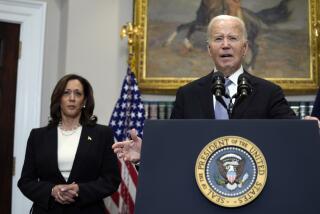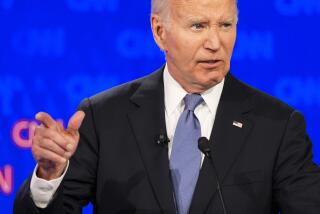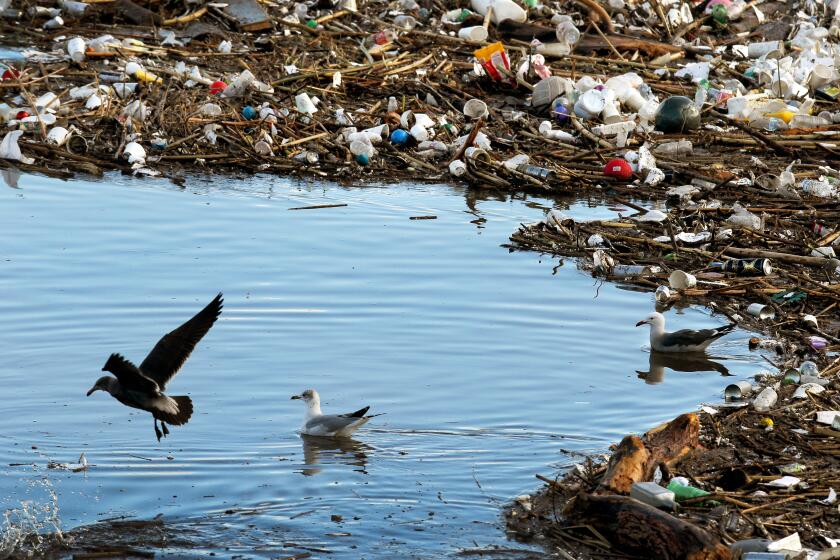Candidates don’t spur bailout deal
WASHINGTON — The presidential campaign swept loudly into Washington on Thursday as Barack Obama and John McCain met with President Bush and congressional leaders at the White House to discuss a massive bailout of the nation’s ailing financial markets.
The candidates’ much-ballyhooed return from the trail, however, appeared to produce more theater than lawmaking. As partisan rancor intensified through the day, there were few signs on Capitol Hill that either McCain -- who had proposed the trip to Washington -- or Obama had managed to bring a deal any closer.
It also did not appear that McCain had fully suspended his campaign, as he had said Wednesday that he would until a solution to the economic crisis was reached. His Republican running mate, Sarah Palin, remained on the trail Thursday, his ads were still on the air, his campaign offices remained open, and fundraising continued.
McCain and Obama came to Washington -- at Bush’s invitation -- after the GOP nominee said it was “time for both parties to come together.”
Obama, who had voiced concerns that the presidential hopefuls would be a distraction to congressional negotiations, stayed away from the Capitol on Thursday, consulting with Democratic leaders and administration officials by phone through the day.
In an interview later with CBS’ Katie Couric, the Democratic nominee said: “It’s important not to inject presidential politics into this . . . because I think sometimes that prevents things from getting done. It’s amazing what you can get done when you’re not looking to try to get credit for it.”
At the White House meeting, Democratic leaders had asked Obama to speak for the party, participants said. Afterward, the candidate expressed support for the ongoing negotiations.
“My impression from the meeting today is that the president and the secretary of the Treasury . . . still have some work to do” in getting House Republicans to agree to Bush’s $700-billion bailout plan.
McCain spent 3 1/2 hours on Capitol Hill before the White House meeting. He did not participate in a bipartisan meeting of senior lawmakers that ended with members of both parties announcing hopefully that a deal was close. He met for about 30 minutes with House Minority Leader John A. Boehner (R-Ohio), then dropped in briefly on a Senate Republican lunch on the other side of the Capitol, where he was greeted with a standing ovation.
After the White House meeting, disputes arose about what McCain had done there.
Several Democrats in the room said he did not indicate his position on the bailout proposal. “Sen. McCain was very unclear,” said House Banking Committee Chairman Barney Frank (D-Mass.), one of the leading congressional negotiators. “We also couldn’t find out whether Sen. McCain was actively supporting this or not.”
But McCain’s campaign spokesman, Brian Rogers, said the nominee had spoken forcefully during the White House meeting. “He made himself very clear that we need to come together to try to get a deal,” Rogers said.
McCain said later in an interview with ABC News that he was hopeful a deal was reachable. “I have talked to many of my colleagues today,” McCain said, downplaying the negotiations that had gone on among senior lawmakers earlier in the day. “There never was a deal,” he said.
GOP opposition to the bailout plan appeared to intensify after McCain’s arrival in Washington. A group of senior House Republicans, including one of McCain’s closest allies, announced an alternative proposal.
Several Republicans, meanwhile, said they were unsure what their party’s nominee was doing. “The rank and file hasn’t heard or seen anything,” said North Carolina Rep. Virginia Foxx.
Frank suggested Thursday that the GOP uprising in the House may be a ruse to benefit McCain. “I think there might have been a little deadlock creation so it didn’t look like he came for nothing,” Frank said.
The idea was swiftly denied by House Republican leaders, including McCain ally Eric Cantor of Virginia, the GOP’s chief deputy whip. Cantor said their plan was “not a product of his campaign.”
Elsewhere, there were other signs that the presidential campaign was very much in swing.
Trailed by camera crews and reporters, Palin visited the former World Trade Center site in Manhattan to tour a museum built as a tribute to the victims of the 9/11 attacks.
McCain’s campaign website still allowed supporters to volunteer or contribute. His national headquarters in Arlington, Va., as well as local, state and regional field offices remained open. And on Capitol Hill, McCain was joined by his senior campaign team, including strategist Steve Schmidt, campaign manager Rick Davis, aide Mark Salter and policy advisor Douglas Holtz-Eakin.
Meanwhile, prospects that tonight’s scheduled presidential debate in Mississippi would go off as planned brightened Thursday.
When McCain said he was suspending his campaign, he suggested that the debate at the University of Mississippi, which was to focus on foreign policy issues, be postponed.
Obama disagreed, saying Americans deserved to hear from the candidates -- one of whom in four months would be in charge of dealing with the country’s financial mess.
Thursday evening, McCain said he hoped to attend the debate after all.
--
bob.drogin@latimes.com
--
Times staff writers Nicole Gaouette, Richard Simon, Michael Finnegan and Peter Nicholas contributed to this report.
More to Read
Get the L.A. Times Politics newsletter
Deeply reported insights into legislation, politics and policy from Sacramento, Washington and beyond. In your inbox three times per week.
You may occasionally receive promotional content from the Los Angeles Times.












